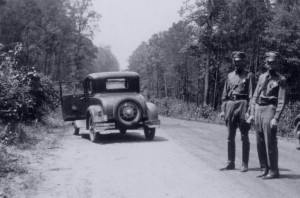Good morning, Whitewater.
Saturday in town will be mostly sunny, with a high of seventy-seven. Sunrise is 5:24 and sunset 8:19, for 14h 54m 57s of daytime.
Bonnie Elizabeth Parker (October 1, 1910 – May 23, 1934) and Clyde Chestnut Barrow a.k.a. Clyde Champion Barrow[1] (March 24, 1909 – May 23, 1934) were American outlaws and robbers from the Dallas area who traveled the central United States with their gang during the Great Depression. At times, the gang included Buck Barrow, Blanche Barrow, Raymond Hamilton, W. D. Jones, Joe Palmer,Ralph Fults, and Henry Methvin. Their exploits captured the attention of the American public during the “Public Enemy Era“, between 1931 and 1935. Though known today for his dozen-or-so bank robberies, Barrow preferred to rob small stores or rural gas stations. The gang is believed to have killed at least nine police officers and several civilians. The couple were eventually ambushed and killed near the town of Sailes, Louisiana, in Bienville Parish, Louisiana, by law officers.
On this day in 1908, a Nobel Prize winner is born in Wisconsin:
1908 – John Bardeen Born
On this date double Nobel Prize winner John Bardeen was born in Madison, Wisconsin. Bardeen attended high school in Madison and went on to study Electrical Engineering at the University of Wisconsin where he received a B.S. in 1928 and an M.S. in 1929.After working at Gulf Research Laboratories, Bardeen returned to graduate studies in 1933 at Princeton in mathematical physics. Bardeen, along with Walter H. Brattain and William Shockley were awarded the 1956 Nobel Prize in Physics for “investigations on semiconductors and the discovery of the transistor effect.”
In 1957, Bardeen and two colleagues, L.N. Cooper and J.R. Schrieffer, proposed the first successful explanation of superconductivity.
He shared the 1972 Nobel Prize with L.N. Cooper and J.R. Schrieffer for the theory of superconductivity. He received the distinguished Lomonosov Award of the Soviet Academy of Sciences in 1987. In 1990, Bardeen was one of 11 recipients of the Third Century Award honoring exceptional contributions to American creativity. He was also named by Life Magazine as one of the “100 most influential people of the century.” Dr. Bardeen died on January 30, 1991. [Source: Nobelprize.org]

